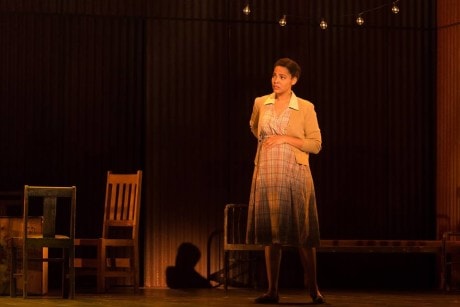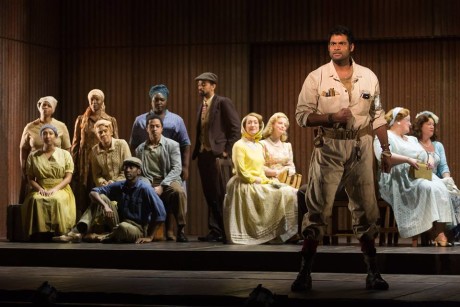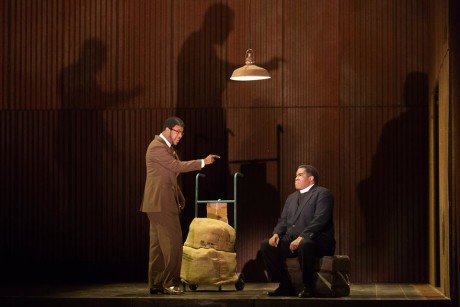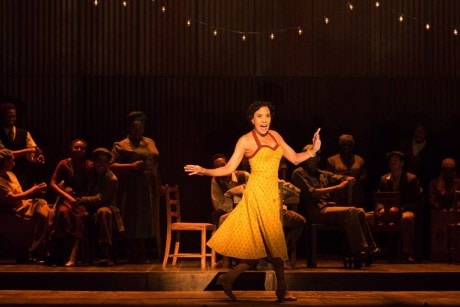One of the most powerful musical dramas of the 20th century has just opened at The Kennedy Center, home of the Washington National Opera, for a one-week run.

And theater lovers who long for the towering achievements of Broadway’s heyday—the 1940s, when names like Gershwin, Hammerstein and Weill dominated the stage—had better scramble if they want tickets for this nearly sold-out production.
Lost in the Stars combines the music of Kurt Weill—who fled Germany in 1933 to become the darling of the Broadway musical—with the lyrics of Maxwell Anderson, a poet and playwright who used blank verse to bring the rhythms of Africa to American ears.
Based on Alan Paton’s Cry the Beloved Country—a searing portrait of racism in South Africa—the story is a familiar one. The novel, first published in 1948, is now a literary classic.
Eric Owens, one of the greatest bass baritones of our time and a two-time Grammy Award winner, plays Stephen Kumalo, a black Anglican priest who sets off from his tiny, God-fearing village to find his son Absalom in Johannesburg. Owens invests the role with a combination of humor, passion, and humility. His powerful voice filled the Eisenhower Theatre during his renditions of “Thousands of Miles,” “The Little Gray House” and “O Tixo, Tixo, Help Me!”
When Reverend Kumalo arrives in Johannesburg, he finds that his son has left his job and fallen in with a bad crowd. Accompanied by Alex, his abandoned nephew—played with sheer exuberance and skill by Caleb McLaughlin —the country bumpkin-like minister descends into the city’s vast netherworld. Together, they journey from the mines and dance halls to the prison where they find Absalom being held for the killing of a white man.
The fact that the dead man is Kumalo’s friend—the anti-apartheid leader Arthur Jarvis (played with firm uprightness by Paul Scanlan)—adds to the horror of the drama.
The discovery triggers a crisis of faith, one that culminates in a soaring rendition of ‘Cry, the Beloved Country,’ an oratorio so powerful that it brought me to tears and, ultimately, to my feet.
Best-known to Washington National Opera audiences for his direction of Appomatox in November 2015, Thompson—like many of us—first read Cry, the Beloved Country in high school. He also went on to perform in it, as a young actor, in a New Day Repertory production at Trinity Church.
Washington National Opera has assembled a cast of 38 artists so talented—and so brilliantly staged and directed—that it is hard to single out individual performances.
Yet there are a dozen who stand out, beginning with Tazewell Thompson, the director who originally put this production together at South Africa’s Cape
In addition to Owens, Lost in the Stars boasts several internationally acclaimed soloists, including soprano Lauren Michelle as Irina, Absalom’s girlfriend. Her voice is pure as a bell in “Trouble Man” and “Stay Well,” and her acting—especially in the scenes with her future father-in-law, the Reverend Kumalo—is as tender as the flower she resembles.

Tenor Sean Panikkar, as the Leader, is a powerful counterpart to Owens, embodying the soul of the Greek chorus-like Ensemble. His is a mesmerizing presence, rallying the people and the audience as he narrates events. His tenor voiced soared in “The Hills of Ixopo,” “Train to Johannesburg,” and “The Wild Justice.”
Cheryl Freeman, a Broadway and Hollywood star who is making her debut in opera, plays the lusty Linda who offers her wares for sale at the shanty town café. She’s a ravishing comedian who lightens the way for the tragedy bound to come, and her rendition of “Who’ll Buy?” is a showstopper.
Several of the performers are familiar faces on the Washington theatre scene. Manu Kumasi, who plays Absalom with a punkish bad-boy-bravado at first, was seen just two weeks ago in The Gospel of Lovingkindness at Mosaic Theater Company of DC.
And Dawn Ursula, who has to be one of the most versatile performers on the Washington stage today, has just emerged from Stage Kiss at Round House Theatre. As Grace Kumalo, she is radiant as a pious woman whose belief shines in her face as she persuades her reluctant husband to set off on the search for Absalom. Ursula also plays Mrs. Mksie, a wickedly funny landlady encountered on the search.
Other featured performers are Wynn Harmon as James Jarvis, the racist father of the dead man. He is furious when his son dares to preach equality, and stirs up the town, singing ‘Fear’ and urging revenge.

Kevin McAllister gives a fine performance as John Kumalo, the minister’s brother, already engaged in the politics of freedom and cheerfully eager to teach his own son to lie.
The staging—masterminded by the director and combined with Michael Mitchell’s sets and costume designs—creates a ritualistic kind of choreography that dramatizes the music.
From the opening song, Hills of Ixopo, where the villagers sing of the beauty of the land, to the glory of Lost in the Stars at the end of Act I, movement tells the story.
A set of high walls forms the backdrop of the set. Lighting, designed by Robert Wierzel, ingeniously transforms the walls—symbolic of the fenced-in world of apartheid—into the prison-like pits of the mines, the corrugated tin of the shanties and the bars of the prison itself.
Most astonishing, the lighting creates a shadow world, in which the illusion of thousands of people looms behind the dozen on stage.
Because it is set in Africa, in both a rural village and the wicked city of ‘Jo-burg,’ hair and makeup design—created by Anne Ford-Coates—play a crucial role in establishing character.
Melding it all together is the music of Weill himself. A classically-trained musician, he invented a new kind of musical theatre—based on social satire—in his collaboration with Berthold Brecht.
In America, he reinvented himself. Turning to George and Ira Gershwin as mentors, he set out to create an opera that was truly American. He named it “musical tragedy.” He chose Broadway over the Metropolitan Opera, which he dismissed as a museum.
Lost in the Stars—which is an open tribute to Porgy and Bess, transplanted to Africa—draws heavily on African spirituals as well as American gospel. Yet it is very much a product of Broadway at the time, born out of vaudeville, ragtime, and the blues.
Conducting the 13-piece Washington National Opera orchestra is John DeMain, whose experience leading world premieres of work by John Adams and Phillip Glass has given him the insight to interpret Weill’s atonal and oddly syncopated score. Under his baton, the orchestra plays with precision and power.

This year marks the company’s 60th anniversary season and its return—after an absence of 15 years—to the much smaller Eisenhower Theater at The Kennedy Center. The intimate setting was chosen for Lost in the Stars and—according to a company spokesperson—will be used from now on for theatrical productions that have entered the operatic canon.
An exceptionally informative program provides The Kennedy Center attendees a lot of background on Cry, the Beloved Country, the book that, ironically, was published just months before apartheid became law. In the program, Director Tazewell Thompson describes revisiting both the opera and the novel with a “deeper sense of how these works magnify how far we, as a race of ever hopeful people, have come.” Both, he adds, are “testaments to the power of art and its ability to confront justice.”
With barely a week to see this production, you’d better hurry. Lost in the Stars is a musical and powerful experience you don’t want to miss.
Running Time: Two hours and 30 minutes, including one 20-minute intermission.
Lost in the Stars plays through February 20, 2016 at the Washington National Opera, performing in The Kennedy Center’s Eisenhower Theater – 2700 F Street, NW, in Washington, DC. For tickets, call the box office at (202) 467-4600 or (800) 444-1324 or purchase them online.
Note: Lost if the Stars is performed in English with English surtitles projected above the stage.
RATING:
LINK:
David Friscic reviews Lost in the Stars on DCMetroTheaterArts.




